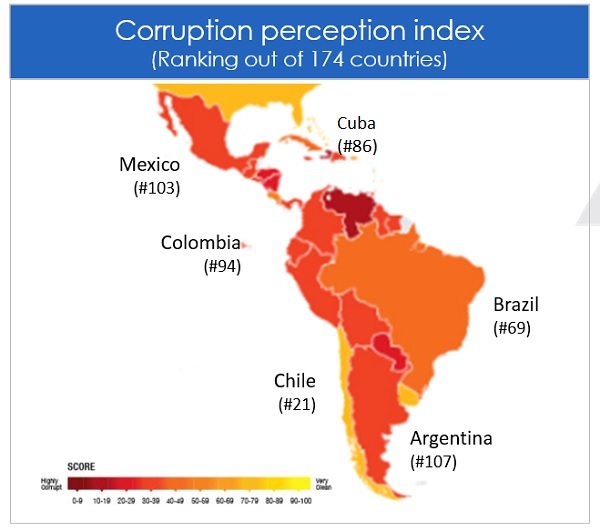Another important development has taken place in the anti-corruption wave in Latin America.
This incident involved the vice president of Uruguay who resigned after months of accusations that he made personal use of the Uruguayan national oil company’s credit cards. The Vice President, Raul Sendic, was the president of the oil company called ANCAP from 2009 to 2013. It was proven that he used the company’s credit card for personal shopping to purchase jewelry, sports clothing and electronics. Likewise, he was ethically questioned by a forum of his own political coalition as he lied about his academic credentials. Sendic claimed he held a degree in genetics from a Cuban university, an argument he strongly defended but later admitted he never received.
This may sound like a joke to the average Latin American especially after the scandals involving the giant Brazilian company, Odebrecht. That scandal involved several Latin American  governments, high level leaders and political parties which were implicated in a bribery scheme making the Uruguayan situation sound meaningless. Indeed, the impeachment of Brazilian former president, Dilma Rousseff, and the incarceration of the former speaker of the Brazilian House of Representatives are major acts of corruption where millions of dollars in bribes involved the highest levels of government in various countries.
governments, high level leaders and political parties which were implicated in a bribery scheme making the Uruguayan situation sound meaningless. Indeed, the impeachment of Brazilian former president, Dilma Rousseff, and the incarceration of the former speaker of the Brazilian House of Representatives are major acts of corruption where millions of dollars in bribes involved the highest levels of government in various countries.
Yet,the Sendic case is not a meaningless case. In fact, it is a symptom of something more important. It is not a matter of how little or big the scandal was or how much money it involved. Sendic was investigated by his own ruling coalition, the Broad Front, which found Sendic’s behavior ethically and politically unacceptable. The ethics committee of the Broad Front reprimanded him for denying wrong doing and found his behavior unbecoming as he was the one who set up the rules and regulations regarding the use of credit cards in the company he then presided over.
- Hits: 6275
 A Stalin no le importaba si se asesinaba a personas inocentes y defendía que estas debían ser sacrificadas para garantizar que los enemigos reales fueran eliminados: “Cada comunista es un posible enemigo oculto. Y puesto que no es fácil reconocer al enemigo, el objetivo se logra incluso cuando solo el 5 por ciento de los ejecutados fueran enemigos reales”.
A Stalin no le importaba si se asesinaba a personas inocentes y defendía que estas debían ser sacrificadas para garantizar que los enemigos reales fueran eliminados: “Cada comunista es un posible enemigo oculto. Y puesto que no es fácil reconocer al enemigo, el objetivo se logra incluso cuando solo el 5 por ciento de los ejecutados fueran enemigos reales”.
 prestaciones sociales que Luxemburgo o Suecia?
prestaciones sociales que Luxemburgo o Suecia?